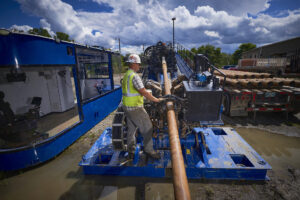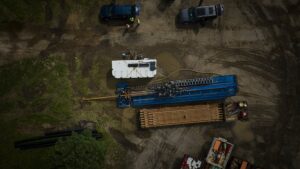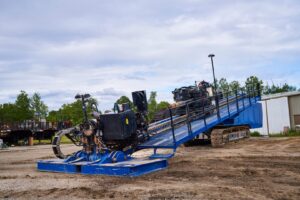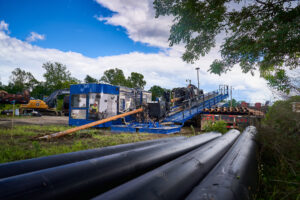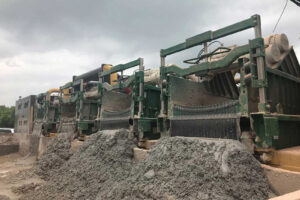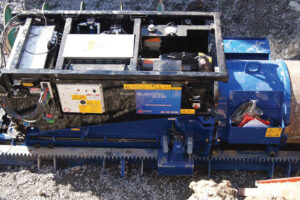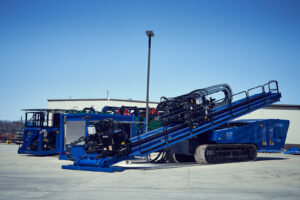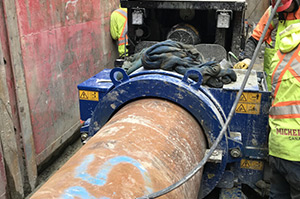BY RICHARD LEVINGS
Auger boring has been a staple in the construction industry for decades. However, the global environmental push to reduce emissions has forced many manufacturers to look at powering equipment differently. With electrical equipment starting to gain traction in many parts of the world, the industry is seeing the beginnings of change. While the adoption of electrical equipment, like electrical auger boring machines, might be slow, the benefits will prove advantageous in the future.
In fact, many cities around the world already have regulations in place that will limit or ban the use of diesel-powered cars in the coming years. And now some cities are eyeing similar regulations to reduce the use of diesel-powered construction equipment. In Oslo, Norway, for example, a new procurement strategy has led to nearly zero-emissions building sites.
However, contractors shouldn’t only consider a shift to using electric equipment as a matter of compliance. A switch to electric auger boring machines offers multiple on-the-job benefits—from quieter and safer job sites, to enhanced equipment performance.
Minimize Fumes
Traditional diesel-powered auger boring machines generate exhaust and diesel fumes. And because the machines are typically used in sub-surface environments, these fumes can create health and safety concerns for workers.
In some jobs, a contractor may need to limit the amount of time operators can spend underground because of exposure to fumes. In addition, the contractor may need to use special equipment to monitor air quality and cycle fresh air down to the pit.
Of course, this can slow down work and add extra costs and logistics to a project.
An electric auger boring machine has no emissions. It allows crews to do their jobs without worrying about breathing in fumes or having to step away from the job site for health reasons. An electric option also saves costs by reducing the need for air-monitoring or circulation equipment.
Reduce Job Site Noise
The loud whir of equipment is a mainstay on any construction site — and too often a factor that limits when a contractor can work. That’s because many cities have noise ordinances in place that only allow crews to run their equipment during certain hours of the day.
Electric auger boring machines are significantly quieter than their diesel-powered counterparts, allowing contractors to work longer on job sites, with less risk of violating ordinances.
This was the case for Swedish contractor Riggtech. The company needed to complete a 36-meter bore as part of a storm sewer installation in the city of Gothenburg, Sweden. Local laws required that construction crews keep noise levels down. Using an electric auger boring machine, Riggtech was able to complete the job while still meeting the city’s noise ordinances.
Increase Visibility
One of the biggest benefits operators have with an electric auger boring machine is the ability to step off the machine and control it from somewhere else.
With wireless remote control, operators can get off the rig or even out of the pit to operate the machine. This can give them more freedom of movement and better visibility through all machine operations.
Also, while noise and vibration are significantly reduced with an electric auger boring machine, they’re not eliminated. Being able to control the machine remotely can reduce on-machine distractions while operators work.
Enhance Operator Performance
From a performance standpoint, contractors will appreciate the greater versatility that an electric boring machine can bring to job sites.
First, an electric machine gives operators the freedom to adjust speed and torque according to what the job requires. On traditional machines, torque and speed are tied together and determined by the operator’s chosen gear. But an electric machine can achieve full torque instantly. This allows operators to balance torque and speed based on soil conditions.
Second, an electric machine can meet a wider range of job demands than a traditional machine.
For example, diesel-powered machines are typically only rated for 0- to 20-degree angles because of a need to keep oil level in the machine. An electric machine doesn’t have this concern, allowing it to be used in high-angle applications. Also, as contractors in places like Canada have discovered, an electric machine is more reliable in extremely cold environments, where diesel-powered machines can struggle to start.
Future Compliance
Regulations limiting the use of diesel-powered equipment won’t take effect for years, but they are coming. Because of this, contractors who are looking to invest in an auger boring machine today may want to take a long-term view with their investment.
Also, while regulations limiting diesel equipment may not be in effect today in most cities, the populations in many cities are largely wanting to see lower emissions in their communities. Contractors who can address this sentiment with solutions like electric machines may be able to strengthen the marketability of their business.
Expanding The Horizon
Early adopters of the industry’s first available electric auger boring machines are discovering how the machines can reduce their job site emissions and improve their operations. From increased operator visibility to machine versatility, electric systems give contractors the ability to stay competitive in the marketplace and meet a broader range of bid requirements.


